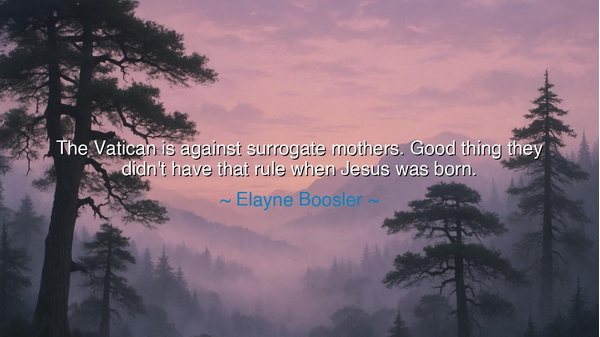
The Vatican is against surrogate mothers. Good thing they didn't
The Vatican is against surrogate mothers. Good thing they didn't have that rule when Jesus was born.






When Elayne Boosler said, “The Vatican is against surrogate mothers. Good thing they didn’t have that rule when Jesus was born,” she cloaked profound truth within the garment of humor. Beneath her wit lies not mockery, but a challenge — a reminder that moral law must always be examined against the backdrop of compassion, context, and human experience. Her words draw upon one of the most sacred narratives in history — the birth of Christ — to expose a paradox in modern faith: that the divine often chooses unconventional paths, while human institutions cling to rules that deny those very possibilities.
In the manner of the ancients, this quote may be read as a parable — an instance where jest becomes prophecy. Boosler invokes the story of Mary, the young woman chosen to bear the child of God, though not through earthly conception. Her body became a vessel of life that was not her own — a sacred form of surrogacy, if one looks beyond dogma and into symbol. Her act was one of faith, not formula; of divine trust, not regulation. Boosler’s humor reminds us that the mystery of creation — whether spiritual or biological — cannot be contained by the limits of human decree. The gods of old would have agreed: life finds its way through the cracks of convention, not through its walls.
The origin of Boosler’s quote lies in her background as a comedian known for wit that cuts to truth with grace and precision. Her humor often reveals the hypocrisy or rigidity within social and religious systems, urging her listeners to think, not merely to laugh. By invoking the Vatican — the seat of one of the world’s oldest religious powers — she is not mocking faith itself, but reminding the faithful that dogma must serve love, not the other way around. She dares us to ask: when rules deny compassion, do they still honor the spirit of the divine they claim to serve?
In ancient philosophy, this same question burned brightly. The Greek playwright Euripides wrote of those who obeyed the letter of the law but forgot its heart, and of those who defied rules for the sake of mercy. So too did Socrates, who challenged the moral rigidity of his city to remind his people that wisdom begins with questioning. Boosler stands in their lineage — the lineage of truth-tellers who, through laughter or logic, remind society that justice without empathy is empty. Her jest is an act of reverence in disguise: reverence for the living essence of faith, which thrives not in decree, but in compassion.
Her words also speak to the modern struggle between tradition and progress. Surrogacy — the act of helping another bring life into the world — is, at its core, an expression of generosity and love. Yet, as Boosler points out, institutions sometimes condemn what is born of kindness simply because it defies their definition of purity. By comparing the miracle of Jesus’s birth to the act of a surrogate, she suggests that perhaps the sacred and the unconventional are not opposites, but kin. The divine often moves through those who break boundaries — through shepherds instead of kings, through a manger instead of a throne, through a young woman carrying a child not her own.
The lesson is clear: do not let rules blind you to the miracle of compassion. Institutions — whether sacred or secular — are made by human hands; but the spark of life, the act of love, belongs to something greater. If a person brings hope into the world — by birth, by care, by courage — then that act is holy, no matter what name the world gives it. Boosler’s jest invites us to remember that the sacred cannot be confined, and that true righteousness lies not in obedience, but in mercy.
So, dear listener, take these words as a reminder to look beyond the veil of doctrine and see the heart that beats beneath it. Faith without kindness becomes stone. Rules without love become prisons. Whether you are a believer or not, live in the spirit of what Boosler’s humor reveals: that divine grace often walks in unexpected forms — in those who give life selflessly, who heal quietly, who nurture what others cannot.
For in the end, Elayne Boosler’s wit carries ancient wisdom: that heaven has never been confined to the temples of men, and that compassion — not conformity — is the truest measure of the divine.






AAdministratorAdministrator
Welcome, honored guests. Please leave a comment, we will respond soon